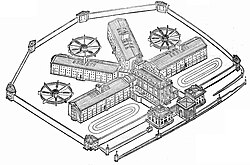| Criminology and penology |
|---|
 |
| Part of a series on |
| Sociology |
|---|
 |
Experimental criminology is a field within criminology that uses scientific experiments to answer questions about crime: its prevention, punishment and harm.[1] These experiments are primarily conducted in real-life settings, rather than in laboratories. From policing to prosecution to probation, prisons and parole, these field experiments compare similar units with different practices for dealing with crime and responses to crime. These units can be individual suspects or offenders, people, places, neighborhoods, times of day, gangs, or even police officers or judges. The experiments often use random assignment to create similar units in both a "treatment" and a "control" group, with the "control" sometimes consisting of the current way of dealing with crime and the "treatment" a new way of doing so.[2] Such experiments, while not perfect, are generally considered to be the best available way to estimate the cause and effect relationship of one variable to another.[3] Other research designs not using random assignment are also considered to be experiments (or "quasi-experiments") because they entail human manipulation of the causal relationships being tested.
- ^ "Experimental Criminology @ Cambridge". University of Cambridge Website. Archived from the original on 1 September 2014. Retrieved 25 May 2017.
- ^ Cite error: The named reference
oxfordwas invoked but never defined (see the help page). - ^ Sherman, Lawrence (2009). "An Introduction to Experimental Criminology". Handbook of Quantitative Criminology. Springer Science+Business Media. pp. 399–436. doi:10.1007/978-0-387-77650-7_20. ISBN 978-0-387-77649-1.
© MMXXIII Rich X Search. We shall prevail. All rights reserved. Rich X Search
